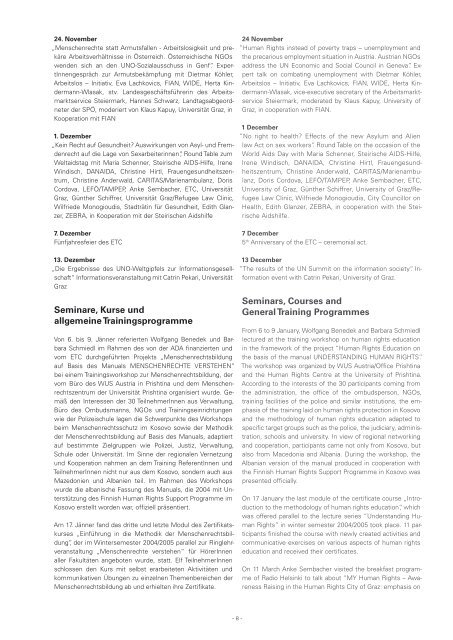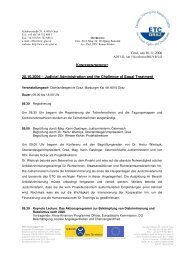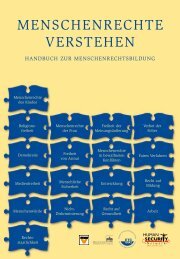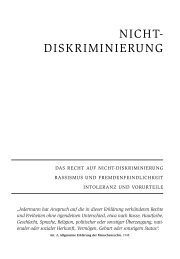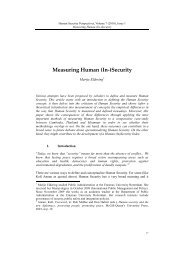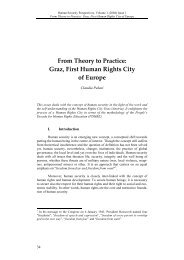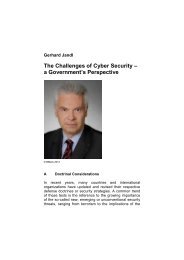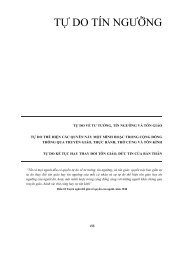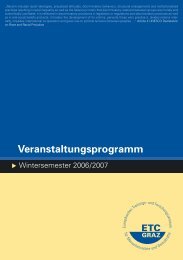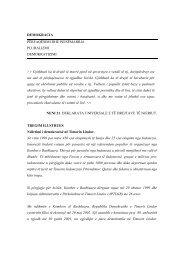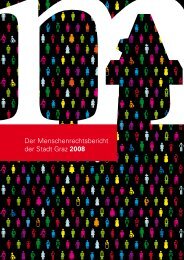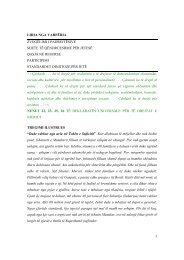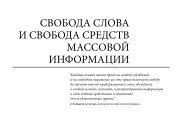deutsch/english - ETC Graz
deutsch/english - ETC Graz
deutsch/english - ETC Graz
- TAGS
- graz
- www.etc-graz.at
Erfolgreiche ePaper selbst erstellen
Machen Sie aus Ihren PDF Publikationen ein blätterbares Flipbook mit unserer einzigartigen Google optimierten e-Paper Software.
24. November<br />
„Menschenrechte statt Armutsfallen - Arbeitslosigkeit und prekäre<br />
Arbeitsverhältnisse in Österreich. Österreichische NGOs<br />
wenden sich an den UNO-Sozialausschuss in Genf“. ExpertInnengespräch<br />
zur Armutsbekämpfung mit Dietmar Köhler,<br />
Arbeitslos – Initiativ, Eva Lachkovics, FIAN, WIDE, Herta Kindermann-Wlasak,<br />
stv. Landesgeschäftsführerin des Arbeitsmarktservice<br />
Steiermark, Hannes Schwarz, Landtagsabgeordneter<br />
der SPÖ, moderiert von Klaus Kapuy, Universität <strong>Graz</strong>, in<br />
Kooperation mit FIAN<br />
1. Dezember<br />
„Kein Recht auf Gesundheit? Auswirkungen von Asyl- und Fremdenrecht<br />
auf die Lage von Sexarbeiterinnen“, Round Table zum<br />
Weltaidstag mit Maria Schenner, Steirische AIDS-Hilfe, Irene<br />
Windisch, DANAIDA, Christine Hirtl, Frauengesundheitszentrum,<br />
Christine Anderwald, CARITAS/Marienambulanz, Doris<br />
Cordova, LEFÖ/TAMPEP, Anke Sembacher, <strong>ETC</strong>, Universität<br />
<strong>Graz</strong>, Günther Schiffrer, Universität <strong>Graz</strong>/Refugee Law Clinic,<br />
Wilfriede Monogioudis, Stadträtin für Gesundheit, Edith Glanzer,<br />
ZEBRA, in Kooperation mit der Steirischen Aidshilfe<br />
7. Dezember<br />
Fünfjahresfeier des <strong>ETC</strong><br />
13. Dezember<br />
„Die Ergebnisse des UNO-Weltgipfels zur Informationsgesellschaft“<br />
Informationsveranstaltung mit Catrin Pekari, Universität<br />
<strong>Graz</strong><br />
Seminare, Kurse und<br />
allgemeine Trainingsprogramme<br />
Von 6. bis 9. Jänner referierten Wolfgang Benedek und Barbara<br />
Schmiedl im Rahmen des von der ADA finanzierten und<br />
vom <strong>ETC</strong> durchgeführten Projekts „Menschenrechtsbildung<br />
auf Basis des Manuals MENSCHENRECHTE VERSTEHEN“<br />
bei einem Trainingsworkshop zur Menschenrechtsbildung, der<br />
vom Büro des WUS Austria in Prishtina und dem Menschenrechtszentrum<br />
der Universität Prishtina organisiert wurde. Gemäß<br />
den Interessen der 30 TeilnehmerInnen aus Verwaltung,<br />
Büro des Ombudsmanns, NGOs und Trainingseinrichtungen<br />
wie der Polizeischule lagen die Schwerpunkte des Workshops<br />
beim Menschenrechtsschutz im Kosovo sowie der Methodik<br />
der Menschenrechtsbildung auf Basis des Manuals, adaptiert<br />
auf bestimmte Zielgruppen wie Polizei, Justiz, Verwaltung,<br />
Schule oder Universität. Im Sinne der regionalen Vernetzung<br />
und Kooperation nahmen an dem Training ReferentInnen und<br />
TeilnehmerInnen nicht nur aus dem Kosovo, sondern auch aus<br />
Mazedonien und Albanien teil. Im Rahmen des Workshops<br />
wurde die albanische Fassung des Manuals, die 2004 mit Unterstützung<br />
des Finnish Human Rights Support Programme im<br />
Kosovo erstellt worden war, offiziell präsentiert.<br />
Am 17. Jänner fand das dritte und letzte Modul des Zertifikatskurses<br />
„Einführung in die Methodik der Menschenrechtsbildung“,<br />
der im Wintersemester 2004/2005 parallel zur Ringlehrveranstaltung<br />
„Menschenrechte verstehen“ für HörerInnen<br />
aller Fakultäten angeboten wurde, statt. Elf TeilnehmerInnen<br />
schlossen den Kurs mit selbst erarbeiteten Aktivitäten und<br />
kommunikativen Übungen zu einzelnen Themenbereichen der<br />
Menschenrechtsbildung ab und erhielten ihre Zertifikate.<br />
24 November<br />
”Human Rights instead of poverty traps – unemployment and<br />
the precarious employment situation in Austria. Austrian NGOs<br />
address the UN Economic and Social Council in Geneva”. Expert<br />
talk on combating unemployment with Dietmar Köhler,<br />
Arbeitslos – Initiativ, Eva Lachkovics, FIAN, WIDE, Herta Kindermann-Wlasak,<br />
vice-executive secretary of the Arbeitsmarktservice<br />
Steiermark, moderated by Klaus Kapuy, University of<br />
<strong>Graz</strong>, in cooperation with FIAN.<br />
1 December<br />
”No right to health? Effects of the new Asylum and Alien<br />
law Act on sex workers”. Round Table on the occasion of the<br />
World Aids Day with Maria Schenner, Steirische AIDS-Hilfe,<br />
Irene Windisch, DANAIDA, Christine Hirtl, Frauengesundheitszentrum,<br />
Christine Anderwald, CARITAS/Marienambulanz,<br />
Doris Cordova, LEFÖ/TAMPEP, Anke Sembacher, <strong>ETC</strong>,<br />
University of <strong>Graz</strong>, Günther Schiffrer, University of <strong>Graz</strong>/Refugee<br />
Law Clinic, Wilfriede Monogioudis, City Councillor on<br />
Health, Edith Glanzer, ZEBRA, in cooperation with the Steirische<br />
Aidshilfe.<br />
7 December<br />
5 th Anniversary of the <strong>ETC</strong> – ceremonial act.<br />
13 December<br />
”The results of the UN Summit on the information society“. Information<br />
event with Catrin Pekari, University of <strong>Graz</strong>.<br />
Seminars, Courses and<br />
General Training Programmes<br />
From 6 to 9 January, Wolfgang Benedek and Barbara Schmiedl<br />
lectured at the training workshop on human rights education<br />
in the framework of the project “Human Rights Education on<br />
the basis of the manual UNDERSTANDING HUMAN RIGHTS”.<br />
The workshop was organized by WUS Austria/Office Prishtina<br />
and the Human Rights Centre at the University of Prishtina.<br />
According to the interests of the 30 participants coming from<br />
the administration, the office of the ombudsperson, NGOs,<br />
training facilities of the police and similar institutions, the emphasis<br />
of the training laid on human rights protection in Kosovo<br />
and the methodology of human rights education adapted to<br />
specific target groups such as the police, the judiciary, administration,<br />
schools and university. In view of regional networking<br />
and cooperation, participants came not only from Kosovo, but<br />
also from Macedonia and Albania. During the workshop, the<br />
Albanian version of the manual produced in cooperation with<br />
the Finnish Human Rights Support Programme in Kosovo was<br />
presented officially.<br />
On 17 January the last module of the certificate course „Introduction<br />
to the methodology of human rights education“, which<br />
was offered parallel to the lecture series “Understanding Human<br />
Rights” in winter semester 2004/2005 took place. 11 participants<br />
finished the course with newly created activities and<br />
communicative exercises on various aspects of human rights<br />
education and received their certificates.<br />
On 11 March Anke Sembacher visited the breakfast programme<br />
of Radio Helsinki to talk about “MY Human Rights – Awareness<br />
Raising in the Human Rights City of <strong>Graz</strong>: emphasis on<br />
Am 11. März war Anke Sembacher im Rahmen des von der Österreichischen<br />
Gesellschaft für Politische Bildung geförderten<br />
Projekts „MEINE Menschenrechte – Bewusstseinsbildung im<br />
Alltag der Menschenrechtsstadt <strong>Graz</strong>“ Gast im Frühstücksradio<br />
von Radio Helsinki und sprach mit Martin Dopler über die Menschenrechte<br />
der Frau auf globaler und lokaler Ebene.<br />
Am 14. März hielt Claudia Pekari im Rahmen des Menschenrechtsstadt-Schwerpunkts<br />
zu älteren Menschen und des EU-<br />
Projektes ABAD einen Workshop zum Thema „Diskriminierung<br />
im individuellen Bereich: Schwerpunkt Diskriminierung durch<br />
sexuelle Orientierung“; die Veranstaltung am <strong>ETC</strong> wurde in Kooperation<br />
mit der GEFAS Steiermark organisiert.<br />
Auf Grundlage des vom <strong>ETC</strong> ausgearbeiteten Manuals für<br />
Menschenrechtsbildung, „Menschenrechte verstehen“, wurde<br />
auch im WS 2005/2006 wieder eine allgemeine Einführung in<br />
die Menschenrechte angeboten, gedacht für HörerInnen aller<br />
Fakultäten sowie für interessierte Gäste von außerhalb der<br />
Universität. (siehe unten IV.1)<br />
Spezielle Trainingsprogramme<br />
Menschenrechte in den Naturwissenschaften<br />
Auch im Jahr 2005 wurde die Kooperation mit dem Pädagogischen<br />
Institut des Bundes in Steiermark (PI) mit einem breiten Seminarangebot<br />
für AHS-Lehrkräfte fortgesetzt. Am 25. Jänner wurde der<br />
im November 2004 begonnene Workshop zu Menschenrechten<br />
in naturwissenschaftlichen Fächern mit einer Arbeitsgemeinschaft<br />
unter der Leitung von Barbara Schmiedl abgeschlossen.<br />
Anti-Diskriminierungstrainings für<br />
RichterInnen und StaatsanwältInnen<br />
Im Rahmen des von der EU geförderten Projektes „Entwicklung<br />
und Umsetzung eines Anti-Diskriminierungstrainingsprogramms<br />
für RichterInnen und StaatsanwältInnen auf Basis der<br />
Menschenrechtsbildung“ wurde aufbauend auf das Pilotseminar<br />
von 2004 in Zusammenarbeit mit dem OLG <strong>Graz</strong>, dem Bundesministerium<br />
für Justiz und dem OLG Linz sowie mit den<br />
Partnern aus Slowenien, Ungarn und der Slowakei ein neues<br />
Trainingsprogramm entwickelt. Ziele des Trainingsprogramms<br />
sind einerseits die Wissensvermittlung zum neuen Anti-diskriminierungsrecht<br />
und andererseits die Bewusstseinsbildung<br />
in Fragen von Diskriminierung im Lichte der Menschenrechte.<br />
Das Programm besteht aus einem rechtlichen Teil, der internationale<br />
Menschenrechte, EU-Antidiskriminierungsrichtlinien und<br />
deren nationale Umsetzung sowie Definitionen von Diskriminierung<br />
in rechtlicher Hinsicht umfasst und einem nicht-rechtlichen<br />
Teil, bestehend aus Definitionen von Diskriminierung in<br />
psychologischer und soziologischer Hinsicht, struktureller Diskriminierung<br />
sowie interkultureller Kommunikation. Zwischen<br />
Jänner und April 2005 führte das <strong>ETC</strong> insgesamt vier Trainings<br />
in Österreich durch. Am 31. Jänner fand das Training für RichterInnen<br />
und StaatsanwältInnen mit 18 TeilnehmerInnen und<br />
7 TrainerInnen in <strong>Graz</strong> statt. Am 9. und 10. Februar wurde ein<br />
Training für RichteramtsanwärterInnen in Zusammenarbeit<br />
mit dem OLG <strong>Graz</strong> und der Gleichbehandlungsanwaltschaft<br />
am OLG <strong>Graz</strong> durchgeführt. Am 2. März wurde das Training<br />
in Zusammenarbeit mit dem Bundesministerium für Justiz am<br />
Oberlandesgericht Wien abgehalten. Am 13. April fand das 4.<br />
Training am OLG Linz statt. Insgesamt konnten 68 TeilnehmerInnen<br />
zu diesem Themenkreis geschult werden.<br />
- 8 - - 9 -<br />
human rights of women”, a project supported by the Austrian<br />
Gesellschaft für Politische Bildung; the programme was hosted<br />
by Martin Dopler.<br />
On 14 March, Claudia Pekari facilitated a workshop on „Discrimination<br />
in the individual sphere: emphasis on discrimination<br />
on the ground of sexual orientation“, in the framework of<br />
the human rights city focus on the elderly and the EU-Project<br />
“ABAD“ organized in cooperation with GEFAS.<br />
In winter semester 2005/206, the lectures series “Understanding<br />
Human Rights“, based on the <strong>ETC</strong> Manual “Understanding<br />
Human Rights“ took place for the second time. Its target<br />
groups were students of all faculties of the University of <strong>Graz</strong><br />
as well as the public. (See below IV.1)<br />
Specific Training Programmes<br />
Human Rights in Science Education<br />
In 2005, the cooperation with the “Pädagogisches Institut des<br />
Bundes in Steiermark (PI)“ in the continuing education of highschool<br />
teachers was extended. On 25 January, the workshop<br />
on human rights in sciences which already began in November<br />
2004 was finished by Barbara Schmiedl.<br />
Non-discrimination training for judges and prosecutors<br />
In the framework of the project “Development and Implementation<br />
of a non-discrimination training for judges and prosecutors<br />
based on human rights education“, supported by the European<br />
Union, a new training programme which built on the 2004<br />
pilot seminar was developed in cooperation with the Court of<br />
Appeals <strong>Graz</strong>, the Austrian Federal Ministry of Justice and the<br />
Court of Appeals Linz as well as project partners from Ireland,<br />
Hungary, Slovakia and Slovenia. The goals of the training are,<br />
on the one side, the transfer of knowledge about the new antidiscrimination<br />
laws and on the other side awareness raising<br />
in matters of discrimination in the light of human rights. The<br />
programme has a legal component, dealing with international<br />
human rights, EU-non-discrimination directives and their national<br />
implementation and legal definitions of discrimination and a<br />
non-legal component, comprising definitions of discrimination<br />
in psychological and sociological terms, structural discrimination<br />
and intercultural communication. Between January and<br />
April 2005, the <strong>ETC</strong> carried out four trainings in Austria. 7 trainers<br />
facilitated the first training for judges and prosecutors in<br />
<strong>Graz</strong> on 31 January. On 9 and 10 February, the training for the<br />
trainee judges took place in cooperation with the Court of Appeals<br />
<strong>Graz</strong> and the Regional Bureau of the Advocacy of Equal<br />
treatment. Another training for judges took place in Vienna on<br />
2 March, hosted by the Court of Appeals <strong>Graz</strong>. On 13 April the<br />
fourth training was carried out at the Court of Appeals Linz. In<br />
total, 68 participants received training on these issues.<br />
Train-the-Trainers Workshop on<br />
Human Rights Education in Bamako/Mali<br />
The Train-the-Trainers Workshop in Bamako/Mali, held from<br />
14 to 18 February, implemented by the <strong>ETC</strong> and PDHRE Mali<br />
brought together 25 participants from Mali and from eleven<br />
other African countries. The workshop was based on the<br />
French version of the manual “Understanding Human Rights”,<br />
the translation of which had been carried out by PDHRE Mali.<br />
The majority of participants came from NGOs, others from the<br />
ministries of justice and education, among all of them repre-


